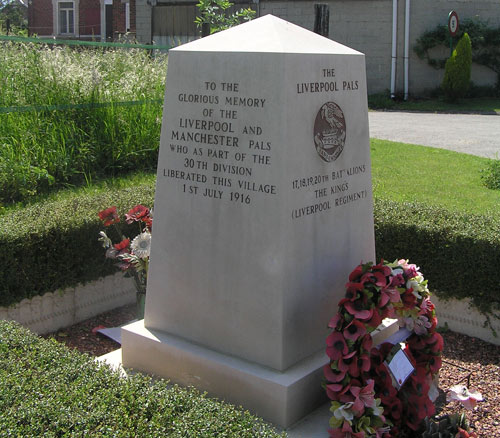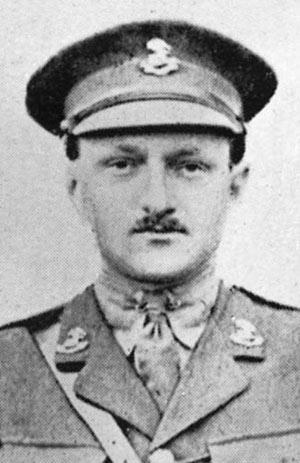
A memorial to the Liverpool and Manchester Pals in Montauban village commemorates their actions on 1 July
In my
previous blog I described how the first day of the Somme on 1 July 1916 was a disaster for the Allies, and I could write an entire article about contributing factors, such as the inadequate reconnaissance, the wrong types of ordnance, the tactical mistakes etc. Instead I want to talk about the contribution of the
King’s Liverpool Regiment on the day.
The Liverpool Pals (17th, 18th, 19th and 20th Battalions of the King’s Regiment) had formed in the early months of the First World War. They arrived at the Western Front in November 1915, and although they had been involved in some small skirmishes, this was to be their baptism of fire. They lined up at Maricourt, on the extreme right of the British line, supported on their right by French troops.
At zero-hour, the Liverpool men moved forward, heading north towards their objective, the trenches in front of the village of Montauban. The 17th, 18th and 20th Pals Battalions were in the first wave of attacking troops. For the 17th and 20th Battalions, the superior French artillery to their immediate right, seems to have helped (the French had many more heavy artillery shells) and they were able to move forward quite quickly and capture their objectives. The 18th battalion had a harder time of it. A German machine gun, set up in a strongpoint to the left of their advance, opened fire and did considerable damage to more than half the battalion, before a bombing party was able to destroy it. Once their objective was secured, the 90th brigade, consisting mainly of men from the Manchester Regiment, was able to move up from behind, ‘leapfrog’ the ‘Liverpools’, and capture the village. The 20th Battalion then launched a successful attack on the Briqueterie, to the north east of the main objective trenches – again this attack was accomplished fairly easily.

Captain Arthur De Bels Adam - killed while trying to destroy the German machine gun that was injuring so many of the 18th Battalion
During the attack, the 19th Battalion had been employed in ‘carrying duties’ which meant they mainly moved supplies through the trenches. They were also tasked with securing the British front line trenches once the attacking troops moved forward. Although they did not take part in the actual attack, they were still involved in the battle and 19 men from the battalion were killed in those first few days.
Over the next few days, the Liverpool men spent their time consolidating the captured ground and patrolling the area.
Only 225 Liverpool Pals died on 1 July (the majority with the 18th Battalion) and their division captured and retained their objectives. Their experience, however, did not reflect the mass bloodshed and failed attacks elsewhere along the line. This was possibly because there were less German troops in this sector, possibly because the defences were not as strong, and certainly because of the artillery support from the French heavy guns.
The Battle of the Somme would continue for 141 days until 18 November. and for Liverpool the big ‘Somme story’ was yet to come. Every day throughout the centenary of the Somme we will be
tweeting, to remember some of the ‘Kingos’ who lost their lives.
Watch out for some
more blogs, to find out why most of the people back home in Liverpool undoubtedly would have heard of the sleepy village of Guillemont by the end of that summer.

 A memorial to the Liverpool and Manchester Pals in Montauban village commemorates their actions on 1 July
In my previous blog I described how the first day of the Somme on 1 July 1916 was a disaster for the Allies, and I could write an entire article about contributing factors, such as the inadequate reconnaissance, the wrong types of ordnance, the tactical mistakes etc. Instead I want to talk about the contribution of the King’s Liverpool Regiment on the day.
The Liverpool Pals (17th, 18th, 19th and 20th Battalions of the King’s Regiment) had formed in the early months of the First World War. They arrived at the Western Front in November 1915, and although they had been involved in some small skirmishes, this was to be their baptism of fire. They lined up at Maricourt, on the extreme right of the British line, supported on their right by French troops.
At zero-hour, the Liverpool men moved forward, heading north towards their objective, the trenches in front of the village of Montauban. The 17th, 18th and 20th Pals Battalions were in the first wave of attacking troops. For the 17th and 20th Battalions, the superior French artillery to their immediate right, seems to have helped (the French had many more heavy artillery shells) and they were able to move forward quite quickly and capture their objectives. The 18th battalion had a harder time of it. A German machine gun, set up in a strongpoint to the left of their advance, opened fire and did considerable damage to more than half the battalion, before a bombing party was able to destroy it. Once their objective was secured, the 90th brigade, consisting mainly of men from the Manchester Regiment, was able to move up from behind, ‘leapfrog’ the ‘Liverpools’, and capture the village. The 20th Battalion then launched a successful attack on the Briqueterie, to the north east of the main objective trenches – again this attack was accomplished fairly easily.
A memorial to the Liverpool and Manchester Pals in Montauban village commemorates their actions on 1 July
In my previous blog I described how the first day of the Somme on 1 July 1916 was a disaster for the Allies, and I could write an entire article about contributing factors, such as the inadequate reconnaissance, the wrong types of ordnance, the tactical mistakes etc. Instead I want to talk about the contribution of the King’s Liverpool Regiment on the day.
The Liverpool Pals (17th, 18th, 19th and 20th Battalions of the King’s Regiment) had formed in the early months of the First World War. They arrived at the Western Front in November 1915, and although they had been involved in some small skirmishes, this was to be their baptism of fire. They lined up at Maricourt, on the extreme right of the British line, supported on their right by French troops.
At zero-hour, the Liverpool men moved forward, heading north towards their objective, the trenches in front of the village of Montauban. The 17th, 18th and 20th Pals Battalions were in the first wave of attacking troops. For the 17th and 20th Battalions, the superior French artillery to their immediate right, seems to have helped (the French had many more heavy artillery shells) and they were able to move forward quite quickly and capture their objectives. The 18th battalion had a harder time of it. A German machine gun, set up in a strongpoint to the left of their advance, opened fire and did considerable damage to more than half the battalion, before a bombing party was able to destroy it. Once their objective was secured, the 90th brigade, consisting mainly of men from the Manchester Regiment, was able to move up from behind, ‘leapfrog’ the ‘Liverpools’, and capture the village. The 20th Battalion then launched a successful attack on the Briqueterie, to the north east of the main objective trenches – again this attack was accomplished fairly easily.
 Captain Arthur De Bels Adam - killed while trying to destroy the German machine gun that was injuring so many of the 18th Battalion
During the attack, the 19th Battalion had been employed in ‘carrying duties’ which meant they mainly moved supplies through the trenches. They were also tasked with securing the British front line trenches once the attacking troops moved forward. Although they did not take part in the actual attack, they were still involved in the battle and 19 men from the battalion were killed in those first few days.
Over the next few days, the Liverpool men spent their time consolidating the captured ground and patrolling the area.
Only 225 Liverpool Pals died on 1 July (the majority with the 18th Battalion) and their division captured and retained their objectives. Their experience, however, did not reflect the mass bloodshed and failed attacks elsewhere along the line. This was possibly because there were less German troops in this sector, possibly because the defences were not as strong, and certainly because of the artillery support from the French heavy guns.
The Battle of the Somme would continue for 141 days until 18 November. and for Liverpool the big ‘Somme story’ was yet to come. Every day throughout the centenary of the Somme we will be tweeting, to remember some of the ‘Kingos’ who lost their lives.
Watch out for some more blogs, to find out why most of the people back home in Liverpool undoubtedly would have heard of the sleepy village of Guillemont by the end of that summer.
Captain Arthur De Bels Adam - killed while trying to destroy the German machine gun that was injuring so many of the 18th Battalion
During the attack, the 19th Battalion had been employed in ‘carrying duties’ which meant they mainly moved supplies through the trenches. They were also tasked with securing the British front line trenches once the attacking troops moved forward. Although they did not take part in the actual attack, they were still involved in the battle and 19 men from the battalion were killed in those first few days.
Over the next few days, the Liverpool men spent their time consolidating the captured ground and patrolling the area.
Only 225 Liverpool Pals died on 1 July (the majority with the 18th Battalion) and their division captured and retained their objectives. Their experience, however, did not reflect the mass bloodshed and failed attacks elsewhere along the line. This was possibly because there were less German troops in this sector, possibly because the defences were not as strong, and certainly because of the artillery support from the French heavy guns.
The Battle of the Somme would continue for 141 days until 18 November. and for Liverpool the big ‘Somme story’ was yet to come. Every day throughout the centenary of the Somme we will be tweeting, to remember some of the ‘Kingos’ who lost their lives.
Watch out for some more blogs, to find out why most of the people back home in Liverpool undoubtedly would have heard of the sleepy village of Guillemont by the end of that summer.
